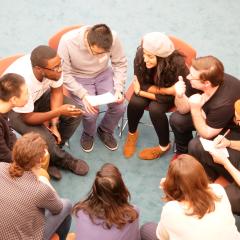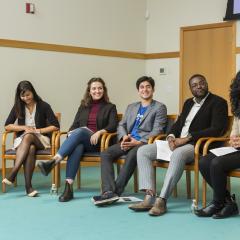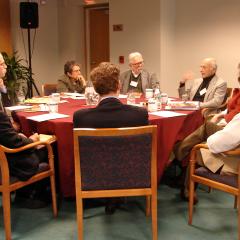Garrison and Hickman: A Multiplicity of Dialogues
We must embrace multiple modes of dialogue if we are to achieve fulfilling lives and the peaceful global community that is desired by diverse peoples of good will worldwide. This was the overarching message of an energetic and wide-ranging discussion that took place at the Center on Saturday, April 6, 2013, as Professors Jim Garrison and Larry Hickman were on hand to engage with a gathering of national and Boston-area university students on themes drawn from the book A New Humanism: The University Lectures of Daisaku Ikeda. This report is by the Center’s Mitch Bogen.
Dialogue and the Greater Self
The first topic considered during the two-hour seminar was how to transform our lesser self and come to recognize and foster our greater self. In Buddhism, the former is associated with selfish desires and the latter with compassion and empathy. Garrison, who is Professor of Philosophy of Education at Virginia Tech University, observed that Daisaku Ikeda articulates an important perspective by insisting that “in striving to discover the greater self, the genuine Buddhist approach is not to try to suppress or wipe out the lesser self, but to control and direct it so as to help lift civilization to better, higher levels.” This notion, said Garrison, is quite compatible with the ancient Greek view that a prime purpose of education is “the education of Eros.” Buddhism, Dr. Garrison added, also teaches through the doctrine of dependent co-arising that no self or phenomenon exists independent of other selves and phenomena. Thus, the movement toward a greater self must always occur in relationship. Dialogue, he said, is a form of relationship that is especially fruitful in fostering the greater self.
Professor Hickman, who is Director, Center for Dewey Studies, and Professor of Philosophy, Southern Illinois University Carbondale, connected this insight with the views of the American Pragmatists, among them William James and John Dewey. It was James, Hickman said, who made the breakthrough of “de-reifying” the self, seeing it as an organization “of habits, desires, motivations, and relationships,” an organization that at times can be very unstable, especially in times of crisis. This instability means that this self—which might more accurately be described as a collection of selves or identities that vary depending on context—is always being influenced, which also means that we have the power to shape the directions in which it grows. One way to promote conscious growth, said Professor Hickman, is through the process of “internal dialogue,” or “communication with our various selves.”
Citing William James’s classic book of 1902, The Varieties of Religious Experience, Professor Hickman identified a particular greater self that is much needed today. James’s greater self, said Hickman, need only connect, in James’s words, with a power “both larger and other than our conscious self.” It need not be infinite as deity-based religions might insist, but it also need not be restricted to strictly material terms, as some secularists or naturalists would prefer. Rather, concluded Dr. Hickman, this self deals with transcendent ideals, making it a more limber or inclusive self that can “open the door” to fruitful, humanistic conversations with “supernaturalists” and “atheists” alike, even those of the “militant kind.” So a key quality of the greater self—one exemplified, said Hickman, in the teachings of Nichiren Buddhism and work of Daisaku Ikeda—is located in its capacity to create bridges of dialogue across the divides that separate the religious from the secular, and also the religious traditions from one another.
Negotiating Identities
Throughout the seminar, students were invited to ask questions of the professors or offer insights based on the evolving discussion. Early on, one student wondered if we can get too attached to particular identities, and what the result of that attachment might be. Professor Garrison replied, absolutely. In fact, he said, “one cannot engage in true dialogue if one is too attached,” since we will not admit new information that might change us. Dogmas and ideologies and prejudices—including racism and sexism—are all forms of emotional and intellectual attachments. He was quick to clarify that we do need healthy attachments to be fulfilled, say, as in a marriage. What we don’t need, he said, are blind attachments.
To illustrate how we must modulate our attachments, Professor Hickman offered an example from the history of the Soka Gakkai, the lay Buddhist organization currently led by Center founder Daisaku Ikeda. A significant phenomenon after WWII, Hickman explained, was that of the “Japanese War Brides,” women who married U.S. soldiers and returned with them to the United States. When Mr. Ikeda visited the United States in 1960, he found that many or most of them were leading isolated lives or longing to return home, so he urged them to realize that becoming full participants in their new culture need not mean the loss of their core identity. Ikeda advised that they undertake simple but potentially disorienting steps such as learning English, getting driver’s licenses, and gaining citizenship. To thrive, commented Hickman, you have to mix things up a bit, and sometimes, he added, this means you have to give some things up to receive others. Later, Professor Garrison built on this notion, placing it in the context of the philosophy of cosmopolitanism, in which we are always co-creating our identities with larger social and cultural influences, participating in still another form of dialogue.
During the second half of the seminar another student wished to return to the question of negotiating identities, specifically how best to consider the needs and realities of marginalized groups in the realm of education without overly “essentializing” just “one aspect of their identity.” Referencing Pedro Noguera’s 2009 book, The Trouble with Black Boys, Dr. Hickman observed that it is critical to customize curricula to account for the diverse cultural identities that students bring to the classroom—students benefit when they see themselves, as they have arrived at school, in the curriculum—but you need to go further, with rigor, encouraging pure intellectual inquiry. This is because, as Deweyan pedagogy holds, when students are introduced to a variety of subjects and disciplines and allowed to pursue their interests, be it the study of history, the building of robots, or the mastery of chess, their unique identities are able to emerge and to grow. Professor Garrison added that questions of identity are fundamental to teaching and learning, but inevitably tricky and fraught. Affirming the student’s insights, he noted than we can limit people if “we cater too much to identity.” We can also err, he said, by using identity as “a tool of confrontation,” thus contributing to us-versus-them thinking.
Professor Hickman cited another insight of John Dewey to add a layer to this discussion. Dewey insisted that we must understand our identities not just as individuals but also as members of what he called “publics,” i.e., groups that form around shared concerns. According to Hickman, Dewey believed that for these publics to thrive and contribute to society they must first develop “a clear sense of what internally the group is about.” Second they must develop “a clear idea of how that public relates to other publics.” The possible combinations of negotiations and dialogues in this framework are nearly limitless.
Variations of Dialogue
To provide some more context, Professor Garrison took a few moments to talk about popular misperceptions about dialogue. First of all, we need to acknowledge that there are some situations in which dialogue is not appropriate or helpful. Resonating with Dr. Hickman’s remarks on the tasks of publics, Garrison noted that dialogue across groups, especially when power differentials are present, are often counterproductive until after dialogues have first occurred within given “affinity groups” as a means of strengthening identity and self-conception. Additionally, some people just are not comfortable speaking out in public dialogue. Garrison noted that it can be just fine for there to be silent participants, whose preferred role is listening. Finally, the most famous form of dialogue—the Socratic dialogue—is itself limited because of its over-reliance on doubt and skepticism as the best tools in pursuit of truth.
Even the seminar’s most significant sub-theme—that of how to balance the positive and negative aspects of technological innovation—proved relevant to the larger discussion of dialogue. Professor Hickman first emphasized that while Daisaku Ikeda has concerns about what he calls “our sophisticated technological system that has had devastating costs in environmental pollution and depletion of the natural resources of the planet,” Mr. Ikeda nevertheless believes wholeheartedly in the scientific method of experimentation. This is crucial, said Hickman, since the scientific method can free us from resorting to authoritarian or a priori claims as to what constitutes the ethical and good. Experimentation in this view is a dialogue with truth.
Dr. Hickman stressed that we must always be in dialogue with what he calls “our tools and techniques” if we are to make sure our technology is changing us in ways of our own choosing or intent. And we will be changed, added Dr. Garrison, saying that this is something that anyone who has ever held a loaded gun—a tool with lethal force—knows very well. Hickman also insisted that we must not dictate in advance what a tool or technique is to mean for others. Everyone, inspired by the greater self, must have an opportunity to pursue his or her own unique dialogue with technology so that we might discover unanticipated benefits that might accrue from tools and techniques that may have been developed with other means and ends in mind. Education, said Hickman, is always about options.
Postscript
The seminar was moderated by current Ikeda Center Education Fellow Julie Nagashima of the University of Pittsburgh. Her cohort in the Ed Fellows program, Mahi Takazawa of the University of San Francisco, also attended. The event was brightened by the participation of four Northeastern University coop students: our current coop Devin Donahue, and three previous coops—Gabrielle Passaro, Teryn Kogura, and Katherine Doerner. After the formal seminar, Professors Garrison and Hickman engaged, over lunch, in nearly two hours of informal dialogue with the students.


